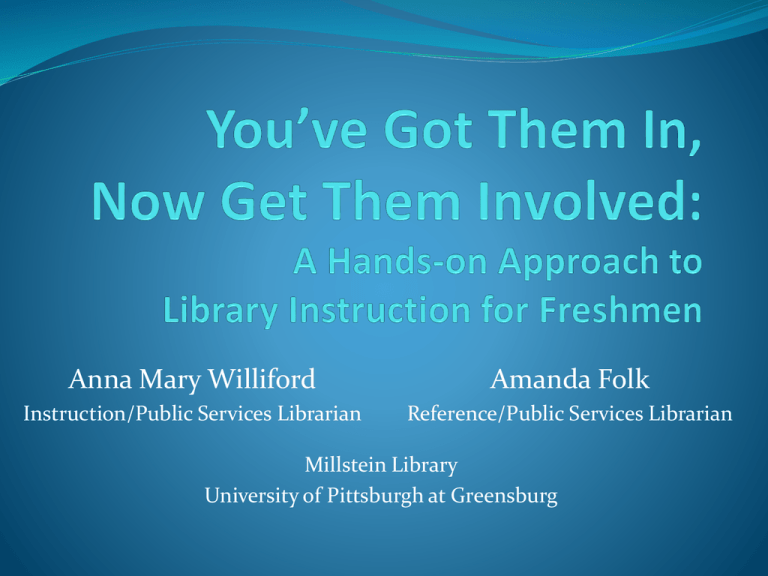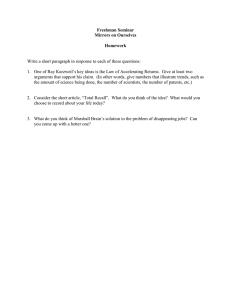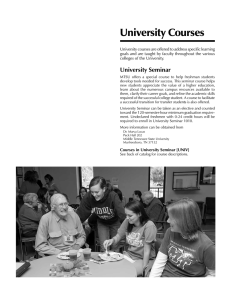YouveGotThemIn PaLA Presentation
advertisement

Anna Mary Williford Amanda Folk Instruction/Public Services Librarian Reference/Public Services Librarian Millstein Library University of Pittsburgh at Greensburg Freshman Seminar @ Pitt Greensburg One-credit, letter-grade course open exclusively to first year students Not mandatory but majority of freshmen do enroll Designed to help students transition successfully from high school to college Some sections are specialized (engineering, Science Learning Communities, ESL, etc) Most are general, with a variety of students Most are taught by staff (advisors, career center, residence life) Most are assigned a peer leader/mentor (upper classman) The Library’s Role Each section comes to the library for two class sessions to learn about library resources and research methods Requirement in the Freshman Seminar syllabus guidelines Most class periods are 50 minutes What was already in place? Students would rotate through stations Tour of the library Quick demo of the library catalog, PITTCat+ Hand each student a notecard with a random call number and have them retrieve the item from the collection Show short tutorials about recognizing scholarly articles and avoiding plagiarism Lecture on basic database searching So What’s Wrong With That? BORING! Sections would often double up No practical application Wasting a lot of time moving around the library from station to station Missing a golden opportunity to provide the majority of our freshmen with hands-on library experience Times, They Are a-Changin’ New public services position created from a vacant technical services position New librarian with first-year seminar experience The tour took up too much valuable time Increase opportunities for interaction and engagement Other Materials Created Script so that students would get the same content in each session, regardless of who was teaching Freshman Seminar LibGuide Feedback Form/Survey Fall 2010: 318 surveys received Fall 2010: 318 surveys received Fall 2010: 318 surveys received Fall 2010: 318 surveys received Assessment Formal Feedback forms Positive feedback for interactive component and level of engagement Negative feedback for “boring topic,” plagiarism, and welcome assignment Informal Instructor observations Interactive component was successful Welcome assignment wasn’t as successful Plagiarism section was painful Changes Based on Assessment No more Welcome Assignment! All modules interactive, not just the first one No more doubling up Article Evaluation replaces Plagiarism “A” Team Brand Implementation Three Years Later… Still going strong! Minor changes only “A” Team dynamic has helped to develop a rapport between us and the students Feedback continues to be positive Fall 2012: 358 surveys received Fall 2012: 358 surveys received Fall 2012: 358 surveys received Fall 2012: 358 surveys received “I think the changes to the library instruction sessions have greatly improved how the students learn about researching topics and using the library resources. It's very hands-on now and gives them the opportunity to see how the process works first-hand. We all know that students learn best by "doing", so by having them brainstorm in small groups and then actually search the system and the physical library, you are helping them to learn it so much better than just by lecturing. The students are "forced" to pay attention and are therefore more engaged during the class time.” R. Leigh Hoffman, Assistant Dean of Student Services and Director of Orientation; Coordinator of Freshman Seminar Program “Several years ago, the library sessions were very informative, but not very engaging. Recent changes to the library classes have given the first-year students a more hands-on approach to learning how to use the library and all of its resources. I definitely see the students walking away with more useful and practical information than they did 5 or 6 years ago. Amanda and Anna Mary have brought a more refreshing approach to teaching the students about the library. This makes the library seem a lot less intimidating than it appears at first glance.” Brian Root, Freshman Seminar Instructor and Assistant Director of Housing and Residence Life “The library session class during freshmen seminar was very helpful in preparing me for many of my other courses. I didn’t even know about the databases before that session let alone how to use them. In every paper I’ve had to write for my composition classes, I have had to access scholarly journals that I learned about during the library sessions. Having been through the session as a student and watching other students take the class as a peer leader for two years, I think the students are able to take away a lot of useful information that may not seem useful to them at that time, simply because they haven’t really had extensive writing and research classes at that point, but in the long run they are able to utilize the skills taught in the session on papers and assignments in the future." Scott Szypulski, Student and Peer Leader Difficulties and Challenges Keeping the mandatory 2 library visits requirement Growing international and ESL population Lack of engagement in seminars without a peer leader Increasing requests for basic composition library instruction Future of the Freshman Seminar program Questions/Comments? Your turn to share ideas! Does your institution currently have a Freshman Seminar/First Year Experience program? If so, what is the library’s role? What advice do you have for what works/what doesn’t? If the library is not involved, could it be? What approach would you take? What would you consider essential to include in a library session(s) for this group of students? Our contact info: Anna Mary Williford Instruction/Public Services Librarian Millstein Library, University of Pittsburgh at Greensburg annamary@pitt.edu Amanda Folk Reference/Public Services Librarian Millstein Library, University of Pittsburgh at Greensburg alfolk@pitt.edu

